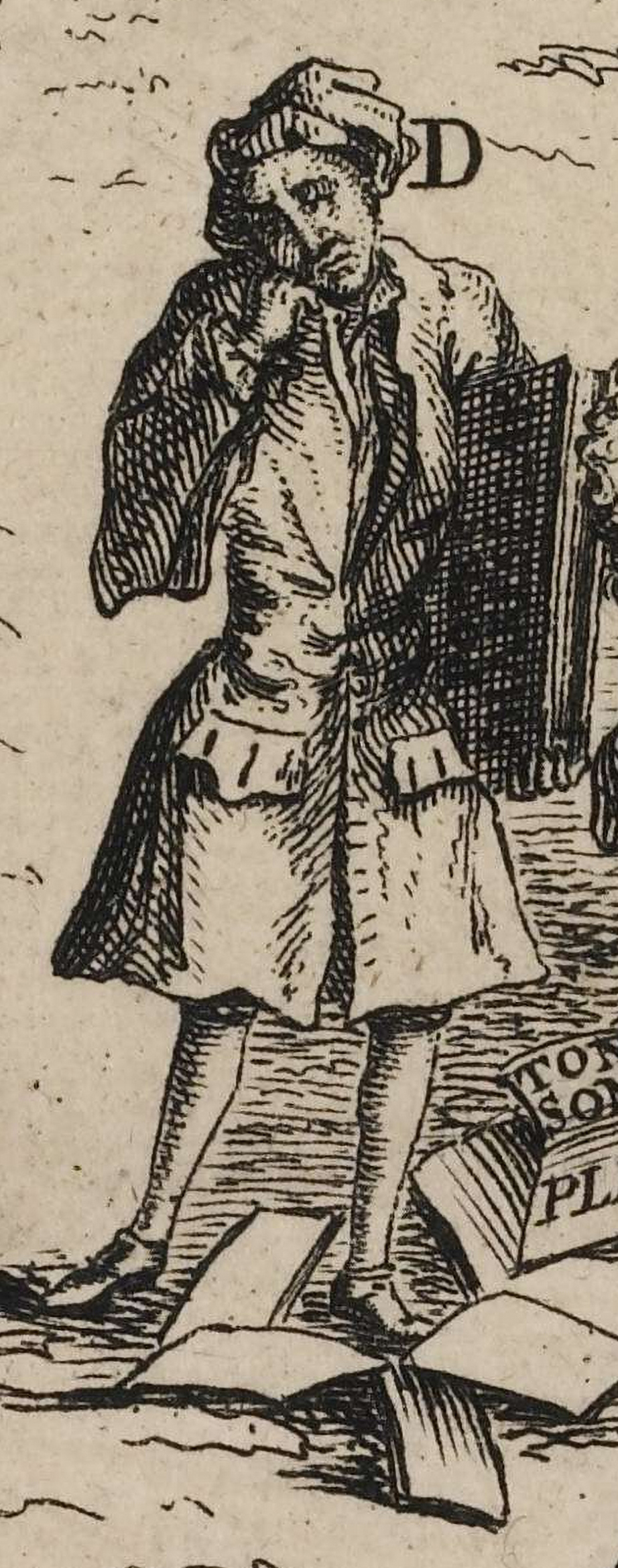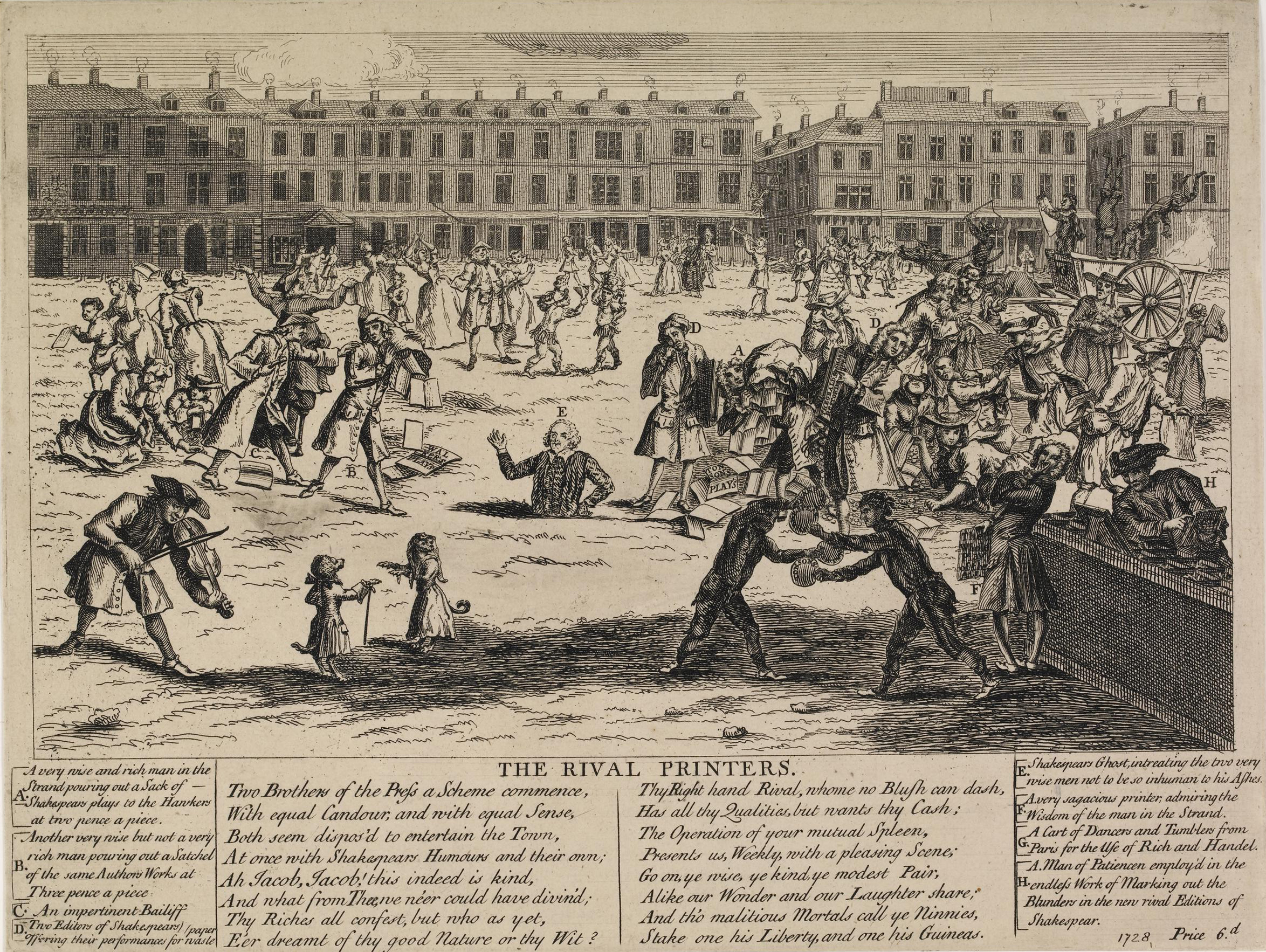
Alexander Pope, detail from The Rival Printers
by an unknown artist
1734
British Museum 1868,0808.3522
The full satirical print below alludes to a dispute between bookseller Jacob Tonson the younger and printer Robert Walker. Walker had begun printing and selling cheap editions of Shakespeare's plays in the fall of 1734, much to the dismay of the well-established and powerful house of Tonson, which had purchased manuscript copies of, and the lucrative copyright to, twenty-three of Shakespeare's plays in 1707 and 1709. Prior to the Statute of Anne (1710), this meant that the Tonsons would have perpetual rights to print and publish the works (with the sole exception provided by the Licensing Act that if a work was out of print and the owner did not, after warning, reprint it within six months, the copyright would be released). The Statute of Anne set out a copyright limitation of 21 years for works already published, which meant the copyright in Shakespeare's plays had expired in 1731, and a significant financial loss for the Tonsons if Walker were to continue.
Tonson the elder had published a multivolume edition of the Works Mr. William Shakespear, edited by Nicholas Rowe, in 1709, and the Tonsons had maintained their copyright by regularly publishing new editions. Two of these were edited by Alexander Pope (six volumes, 1725) and his rival Lewis Theobald (seven volumes, 1733), shown here with reference to their acrimonious dispute in print after Theobald published his quibbling Shakespeare Restored: Or, a Specimen of the Many Errors, as Well Committeed, as Unamended, by Mr. Pope In his Late Edition of this Poet (1726), and Pope had named Theobald his king Dunce in The Dunciad (1728, 1729). Walker and Tonson too carried out their dispute publicly in print, Walker proclaiming that Tonsons had no monopoly on Shakespeare's works, and Tonson calling out Walker's actions as (among other things) a “vile Practice” of piracy that stood to ruin the bookselling trade.
The image emphasizes the dispute between Walker and Tonson as a public performance, a low sort of entertainment for an easily amused audience. The central figure of the image is Shakespeare's ghost emerging from the street as a performer would from a trapdoor below the stage. Front left is a fiddler and two dancing dogs. Toward the rear on the right is a cart driven by Harlequin bringing dancers and acrobats to perform for John Rich and George Frideric Handel at the Covent Garden Theatre. Immediately behind Shakespeare's ghost, a man whose stance is reminiscent of actor and theatre manager Theophilus Cibber as Shakespeare's Ancient Pistol beams upon two duelling little people or dwarfs dressed in gladiator costumes, their postures reiterated by two printer's devils at the forefront of the scene who box with inking balls, one set labelled "Tonsons" and "Shakespeare" and the other, "Walkers" and "Shakespeare." A bailiff carrying a mace proceeds to arrest Walker on the left, the pair mirrored on the right by a bailiff seizing a man who likely represents the famous prize-fighter James Figg, whose Amphitheatre in Marylebone featured viiolent duels on stage.
The key below the image reads:
A. A very wise and rich man in the Strand pouring out a Sack of Shakespears plays to the Hawkers at two pence a piece. [Jacob Tonson, with coins falling from his pockets]
B. Another very wise but not a very rich man pouring out a Satchel of the same Authors Works a Three pence a piece [Robert Walker]
C. An impertinent Bailiff
D. Two editors of Shakespears offering their performances for waste paper [Alexander Pope on the left and Lewis Theobald on the right, carrying copies of his "restored" Shakespeare]
E. Shakespear's Ghost, intreating the two very wise men not to be so inhuman to his Ashes.
F. A very sagacious printer, admiring the Wisdom of the man in the Strand. [unidentified, he holds a sheet lettered "The Whole Play of the Ass"]
G. A cart of Dancers and Tumblers from Paris for the Use of Rich and Handel.
H. A. Man of Patiencen employ'd in the endless Work of Marking out the Blunders in the new rival Editions of Shakespear.

—Allison Muri, January 2023
© The Trustees of the British Museum
This image is provided courtesy of the British Museum under a Creative Commons Attribution-NonCommercial-ShareAlike 4.0 International (CC BY-NC-SA 4.0) licence. In certain other jurisdictions it is considered to be in the public domain.